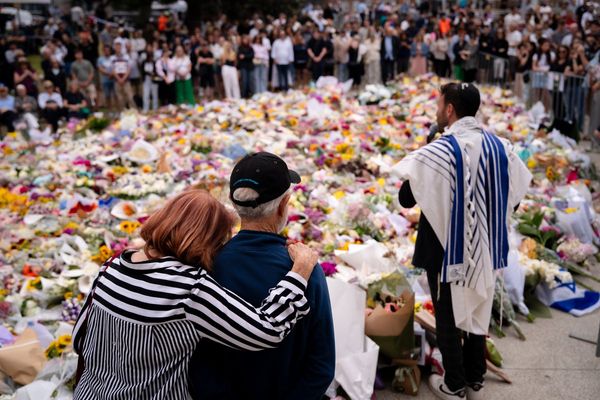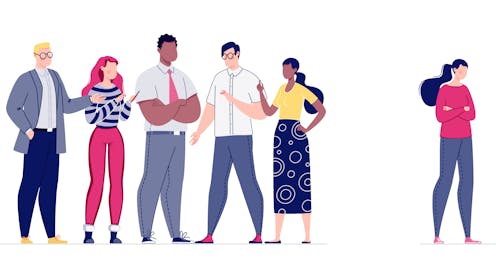
Pseudonyms are used in this article; interviewees who asked for their real names to be used are asterisked.
In 2016, one of us (Kath) attended New Normal, a conference in London which opposed LGBT+ rights, including lesbian parenting and gender recognition. As a lesbian parent, I was upset by what was said – and by the way people stood to applaud speakers who warned of the dangers of parents like me, while mentioning the need to “protect children”.
Yet that conference also opened my eyes to my – and perhaps, many other people’s – lack of understanding of what it can mean to stand against the apparent state-supported, liberal consensus on such issues. On day two, the organisers appealed for help for the parents of a trans or gender-diverse child. My notes from that day read:
The parents feel they are not listened to, and are ‘encouraged by social services’ to treat ‘her’ like a boy. But social services have only known ‘her’ for six months – so they don’t know ‘her’. The parents are told if they don’t agree to a name change, it is neglectful and that she is suicidal. The mother argues: ‘We love our daughter.’
Unexpectedly and conflictually, I found myself relating to the parents’ story in some way. And I wondered how I would feel as a same-sex parent if I was ever in a situation where my child rejected their family as a “moral abomination”.
These thoughts proved a starting point for Beyond Opposition – our project which, since 2020, has been looking at the lives of people who are reticent about or object to the perceived liberalising of societies’ sexual and gender laws in Great Britain, Ireland and Canada.
The idea of this research is not to defend their positions. Nor is it to explore their politics around sexualities and genders, which we and many others do in research into anti-gender movements. Rather, we wanted to understand the experiences that might drive these politics.
The Insights section is committed to high-quality longform journalism. Our editors work with academics from many different backgrounds who are tackling a wide range of societal and scientific challenges.
As far back as 2012, prompted by my colleague, urban geographer Catherine Nash, I (Kath) began noticing an evolution in arguments against changes like same-sex marriage, gender recognition and relationship and sexuality education in schools – an evolution that was not always fully recognised, or even noticed, by supporters of these changes. People who objected to such societal shifts were sometimes being politicised through court cases around their work and their children’s experiences at school.
For Beyond Opposition, we put a call out to people who opposed or had concerns about changing laws and policies related to gender, sexuality or abortion. As well as contacting organisations and activists who actively campaigned against these changes, we used social media to reach out to people who had no connections with these groups.
In more than 160 interviews between 2020 and 2022, we explored the daily experiences of living outside the social consensus in three countries where, at the time, there was broad legal, political and social agreement in favour of same-sex marriage, abortion, gender self-identification and related policies. The surprising diversity of positions and experiences we heard not only shed new light on how societies were changing; they painted a sometimes disturbing picture of how these shifts were being challenged and resisted.
Not all far-right
In the 1990s in secondary school, I would have been completely open about my view on [abortion], because it was a more accepted view, I suppose … [Now] I have this view and don’t feel I can even express it [because] everyone else disagrees … I feel like I can’t even say this to anyone.
We first met Niamh in 2021, three years after Ireland’s historic referendum to repeal one of the EU’s strictest legal barriers to abortion, which led to limited access to abortion care. Where once her anti-abortion views were considered mainstream, in Ireland and many other countries where abortion is accepted legally and socially, now her views are in the minority.
Niamh was clear she did not regard herself as “conservative” and said she was strongly in favour of human rights. She told us: “If I have to categorise myself, I’d categorise myself as ‘pro-life’.” But she expressed frustration at how people assumed this position automatically predicted what she thought about other topics relating to gender and sexuality, explaining:
There’s this thing that’s like: [because] you’re against abortion, you’re against same-sex marriage or against refugees coming into the country … I struggle with it because the people in my circle on social justice issues are not usually aligned with my [anti-abortion] position. They tend to have the opposite view – [mine] tends to be seen as a really conservative stance, not a rights-based stance.
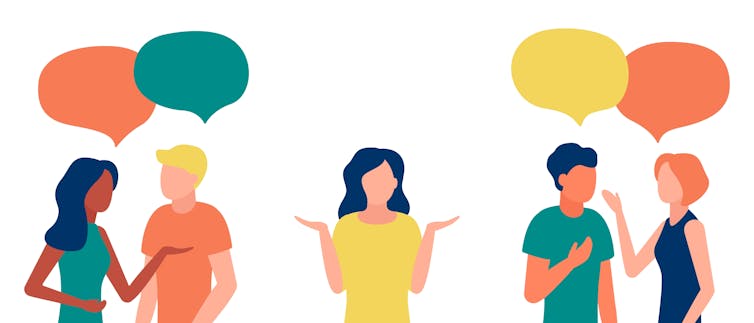
Niamh, like many of our interviewees, expressed views quite differently from the organisations opposing sexual and gender equalities that I (Kath) had encountered in earlier research. While those organisations were diverse, they were often aligned on abortion, same-sex marriage and gender recognition. This contrasted with the differences that people such as British woman Jane identified when we met her.
“I wouldn’t want to sit down in a room with somebody who said gay people were going to hell,” Jane told us. “We just wouldn’t have anything to talk about.” But she also felt it would be “impossible to have a conversation with somebody who does not believe in the existence of biological sex”.
While Jane objected to trans rights being “given primacy”, she thought of herself as different to people who are seen as anti-gender activists. Describing herself as “gender critical”, she said: “Why this is so toxic and has started to spill out into my day-to-day life is that we are all just lumped under one umbrella of hate.”
Like many of our interviewees, Jane objected to being placed in a single category that, in her experience, carries overwhelmingly negative associations. She told us her daily life was being affected because people attributed opinions to her that she considers hateful.
On the whole, public attitudes across the EU and Canada still favour a broadening of gender and sexual inclusion. But academic research on changing social norms relating to gender and sexuality is largely silent on how these changes can affect those who “do not agree”.
Many of our interviewees emphasised their distance from other people who held similar views. Indeed, this sentiment of not fitting a stereotype was so common that we still have no single phrase to describe the group of people we spoke to. Common terms like “anti-gender” or “far-right” were rejected by most participants.
Yet we found the experiences they described had a lot in common. James, in Ireland, said he “came down towards the ‘no’ side” in the 2018 Irish abortion referendum, yet the social associations of this troubled him:
I definitely wouldn’t ever go on a pro-life parade or protest, or anything like that. I see those people [as] ultra-religious conservatives who are not free-thinking, who want to just force their opinions on other people. There’s no way I could ever want to be associated with people like that.
While most interviewees resisted the stereotypes they say get assigned to their position, pushing back against being seen as anti-rights or anti-equalities, some did express positions more in line with a stereotypical anti-gender activist. Brian in Canada, for example, told us he was “in a pro-life Catholic Christian bubble”, and that he would not welcome gay or trans people into his home for dinner.
‘I don’t feel comfortable in my own house’
Anne, a Canadian woman who described herself as a feminist with gender-critical opinions, said she had withdrawn from her volunteer work supporting survivors of sexual violence because she recognised that “my gender-critical opinions are really toxic to others”.
But the relationship that most troubled her was with her daughter. Anne described how her home life had been significantly affected by her interest in “gender-critical” content:
In my house, which should be the place where I feel the most comfortable, at no time do I discuss these things. If I’m watching a video with these concerns, or am online in some way with these concerns, when my daughter who lives with me comes into the room, I turn it off. So I don’t feel at all comfortable in my own house.
Anne was distressed by the impact her gender-critical position had on her relationship with her daughter. She recognised that content she sometimes viewed was considered “toxic” by many people, including her daughter, and expressed sadness about the damage this had done to their relationship:
It’s very saddening to me because my daughter and I are so close, but this has become a barrier. It has become a block. The only time we talked about it at length, we were both in tears.
We heard a number of stories like Anne’s, of close relationships becoming deeply fractured by differences on such topics. These interviewees felt their positions were fundamentally opposed by family members. Some, conscious of the tensions, kept their views to themselves even in their own home. As a result of her differences with her daughter, Anne said: “I don’t speak to her about anything in order to keep peace in the house.”
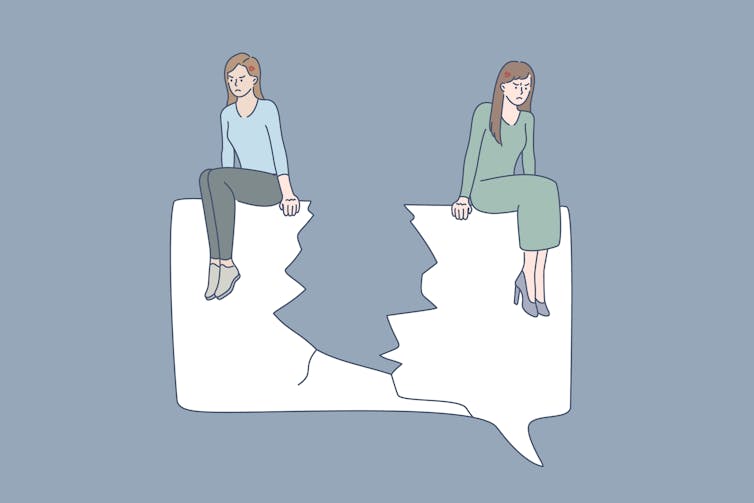
Ciara, a leftwing Irishwoman who voted against abortion in the 2018 referendum, described the careful way she navigated her friendships, recognising that her friend group would hold very different views to her on abortion:
You kind of judge the friendship a little bit. Can this friendship take this news that I voted ‘no’? [Laughs] I’ve lied – I’ve told others I voted ‘yes’.
Ciara noted that in her everyday life, it was generally assumed everybody was pro-choice – as she had once been. She was not religious and, like many of our interviewees, distanced herself from rightwing politics.
But in her family and among her friends, being against abortion was automatically understood as being rightwing, so she kept quiet about it. This made her question herself, resulting in what she described as “a whole range of inner dilemmas”:
You strategise – you suss out, like, how is this going to go down? How is this going to impact on this friendship? And on trust – how will I be seen?
Keeping quiet among friends and family makes concerned, oppositional positions harder to see and understand. So, it is possible for researchers and others to deny these positions exist – and to not address their impact. Many people spoke to us on condition that their identities would be concealed – something that came across especially strongly when they spoke about their fears at work.
‘At work, I can’t risk my livelihood’
Work is central to many people’s lives. Tammy* from Canada, who described herself as “not a pro-gay person, just a pro-people person”, told us she felt uncomfortable with some workplace inclusion policies, such as Pride month:
At work, we have an app on our phone and … for gay pride, in June, the whole month is just devoted to that history, right? And it annoys me because it’s like: OK, I get it … [but] I don’t like people trying to program me.
The promotion of LGBTQ+ rights through corporate platforms made Tammy feel suspicious. Other Beyond Opposition participants went further, fearing their jobs could be at risk.
For Cindy, who is also from Canada and described herself as “dabbling in gender-critical feminism”, her position was out-of-line with her workplace. Her employer took positive actions to promote LGBTQ+ inclusion. She felt that to object to such actions might “risk my livelihood, so I can’t even broach the subject”.
It was not only the owners and managers who Cindy feared would view her “as a bigot”. She also worried that colleagues might cause conflict for her if she expressed her position outside the workplace consensus.
Like others in our research, Cindy deliberately stayed out of activism. But during her mandatory workplace training, she said: “The whole time I’m biting my tongue.” Her concern was that she might be obliged to take an action that she didn’t believe in:
If anyone were ever to say: ‘Go around the room and say your preferred pronouns,’ I’m not sure how I would answer that because I don’t believe in the ideology of preferred pronouns. I worry that if I just said something like: ‘No thank you, I don’t believe in it,’ that might actually cause me to lose my job.
Workplace inclusion policies, training and practices have been shown to be effective in improving workplaces in terms of their productivity and wellbeing for employees – although in some cases, they can be poorly implemented and insufficient. But some of the people we spoke to, including Tammy and Cindy, described them as “feared” and “hated”.
Mark went even further, suggesting he was being asked to deny his “moral values” – and that his work would not be secure if he didn’t. A freelance worker in rural Ireland, Mark believed he needed to “keep his head down” with regard to his views on sexuality and abortion:
I’m self-employed … I can say it here to you but I’m certainly not shouting about this in the pub. I depend on the milk of human kindness from people.
Some of our interviewees have used the law to challenge employers where their jobs were lost or under threat. Most had not experienced any official sanctions – yet many feared them. Cindy said that as a result, she kept her views to herself at work: “I guess I choose harmony and peace over being right.”
It is these “quiet concerns” at work and among family and friends – of people who are not vocal in opposition to changing laws and policies, but still act against them – that we believe are not well documented or understood. And our research shows that in their experience of being negatively labelled and having their experiences dismissed or minimised, some have been driven to look beyond their usual communities to find support for their views.
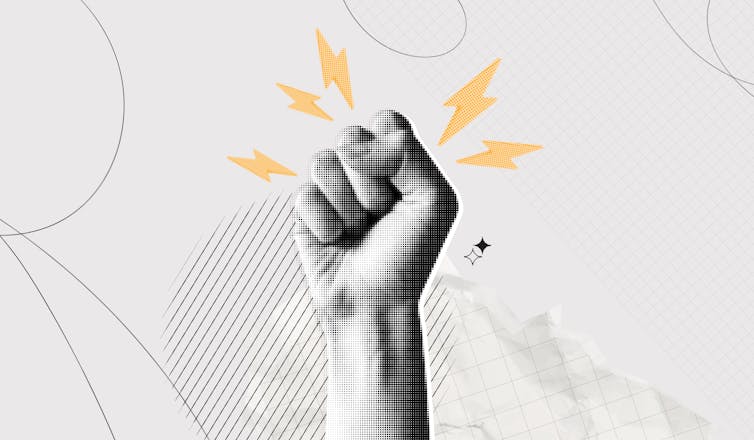
Accidental activists
Although most people in our study are not activists and did not seek to be public about their views, many quietly supported those who were, or engaged with them to find support for their views.
Those who felt uncomfortable talking to people in their own circles often told us about how they had found support elsewhere. Suzy, a British woman who said she was gender critical, described the first meeting she had attended that opposed trans rights:
I just happened to make the decision to go [to a conference run by an organisation opposing gender self-identification] on my own … I had nobody in my life at that point who was a feminist who had these views. It’s why I went by myself. And I met some really amazing women who just completely welcomed me into this world. That opened a lot of doors for me.
Suzy’s experience was echoed by others who had concerns about trans rights or gender recognition. Such groups were not always public, and some organised in secret – something Suzy believed was unjust but necessary, because of the distance from the social consensus of people who held views like hers:
There is a private online messaging app – you have to be invited. I had to be vetted … to make sure I was a real person – [that] I wasn’t trying to infiltrate. It’s so ridiculous that we are having to jump through these hoops just to talk about it and express our opinion about something that for a really long time was okay to think. Now all of a sudden, it’s not okay to think this way. So you’re a societal pariah.
At the time of our interview in 2020, Suzy was actively involved in organising to oppose the proposed amendments to the UK’s Gender Recognition Act. She had moved from having “nobody in my life … who was a feminist who had those views”, to participating in an organised campaign to influence this legislation:
I wouldn’t necessarily describe myself as an activist – I think that word is quite a bit loaded in negative connotations now … I prefer the term ‘campaigner’ because what I started to get involved in was campaigning for the law not to be changed. I wasn’t going out on marches or anything like that.
Proposals to update the Act in line with international human rights standards stalled and then were halted in the UK from 2018 onwards, with the support of civil society campaigners including Suzy. Since then, other campaigns have had greater successes – including, most recently, a Supreme Court ruling defining “sex” as “biological sex” in the 2010 Equality Act.
‘I’m not saying that I am right’
For the many people who have spent years campaigning for gender equality and to improve LGBTQ+ lives, it is possible to understand the day-to-day accounts of our interviewees as evidence of success. Many told us they could not now express opinions on others’ relationships, sexual activity or their decisions about pregnancy and parenthood in some workplaces – and sometimes even at home.
For some interviewees, this shift was expressed as fear, where their positions were seen to negatively affect them at work even if they didn’t express them openly. They didn’t feel able to raise questions about gender and sexual equality or abortion at work or in their volunteering and organising spaces.
It is possible to understand this shift as a welcome victory for equalities. But our research highlights that, for many people who maintain reticence to these societal changes, the ability to reconsider or change their position has been reduced by their day-to-day work, social and family experiences.
Cindy, for example, expressed a moment of doubt about her concerns about trans rights, admitting: “I’m not saying that I am right. Like, there is the possibility I’m not …” However, this reflective stance was not encouraged by experiences of work that she described as forcing her to “bite my tongue”.
She and others told us the implementation of inclusion policies and training in their workplaces felt paradoxical – because they’d had the effect of making their own behaviour less inclusive. Cindy admitted she was less inclined to question herself because of the way she felt her views were treated.
Mark, the freelance worker in Ireland, considered himself “very leftwing” and said he would “always defend the underdog”. But he told us people like him were “very much put off” by what he saw as the “tactics of what now are leftwing liberal policies”. His experiences of feeling outside the consensus, and fearing a loss of employment opportunities, meant he – and others we interviewed – were less open to engaging sympathetically with the experiences of sexual- and gender-minoritised people.
Fear, upset and discomfort from social change
While stories like Niamh’s and Cindy’s are sometimes used to argue that transformations have “gone too far”, research does not support this argument. In fact, those “left out in the cold” are typically the LGBTQ+ people whose needs are not being met by policies like same-sex marriage (or who remain excluded from these policies), and those seeking sexual and reproductive healthcare in all its forms.
Our interviewees do not negate this. They highlight the fear, upset and discomfort that results from social change for some people who hold firm to their positions opposing or questioning provisions such as abortion, same-sex marriage, gender recognition. In research, these everyday experiences are rarely considered beyond their political views (assumed to be rightwing) and how to explain or change them.
Our interviewees believe their positions are frequently mis-characterised and conflated in the media and by policymakers in order to dismiss them – and therefore, that their experiences go unseen and unrecognised. And in their experience of being outsiders – feeling labelled and minimised – they may, like Suzy, find their way to actively opposing legislation and social change that benefits LGBTQ+ people and/or those who need abortion rights. Some offered quiet support to political causes, including donating their time or money.
The world today is very different even to 2022, when we finished the Beyond Opposition interviews. The UK has seen some fundamental shifts especially regarding gender recognition, including the recent Supreme Court ruling that defined “sex” as “biological sex” in the 2010 Equality Act.
In the US, providing affirmative care to trans children was deemed “mutilation” in recent executive orders from the president, Donald Trump, which stated that offering support to trans and gender-diverse children against their families’ will would be considered as “child abuse”.
As the struggle for rights continues, we believe it’s essential for research, policy and practice to pay attention to the full range of impacts of the divisions that drive much of today’s politics. Experiences like those of the parents at the conference mentioned at the start of this article, who felt that affirming their child’s gender identity went against their beliefs, contribute to the shape of the world we all live in.
It is possible to have a clear and firm view on the rights of trans and gender-diverse children, while also considering the implications for society of the experiences (as distinct from the opinions and arguments) of those who disagree. It feels important to do this now in places where some of us – lesbian parents, parents of trans kids and others – are still (somewhat) protected by the system, as we find ourselves, in the US and elsewhere, once again labelled “a danger to children”.
For the second phase of Beyond Opposition, we brought people together from very different positions to see if they could imagine a world where they could live together, without seeking to change each other’s minds. We wanted to know if there were new ways of thinking about the problem of division, which recognised that some differences may be here to stay.
Our intention was not to debate, negotiate or resolve their differences, but to explore the idea that it may be necessary to live together without ever agreeing on aspects related to gender, sexuality or abortion. One key outcome of these workshops was a number of moments in which participants met a complete impasse – where they had to acknowledge that their utopia could not accommodate the other person’s position at all.
This is a starting point for important questions about not being able to change someone else’s mind, yet still needing to share places with them. We hope to write more on this subject soon.
For you: more from our Insights series:
To hear about new Insights articles, join the hundreds of thousands of people who value The Conversation’s evidence-based news. Subscribe to our newsletter.
Dr. Carol Ballantine researches genders, sexualities and violence. She worked as the Ireland and UK postdoctoral researcher on Beyond Opposition, funded by the ERC.
This article is funded by work undertaken under the ERC Grant No: 81789 granted to Kath Browne and also receives EU Horizon Europe funding. She has worked for LGBTQIA+ organisations is affiliated with LinQ.
This article was originally published on The Conversation. Read the original article.


